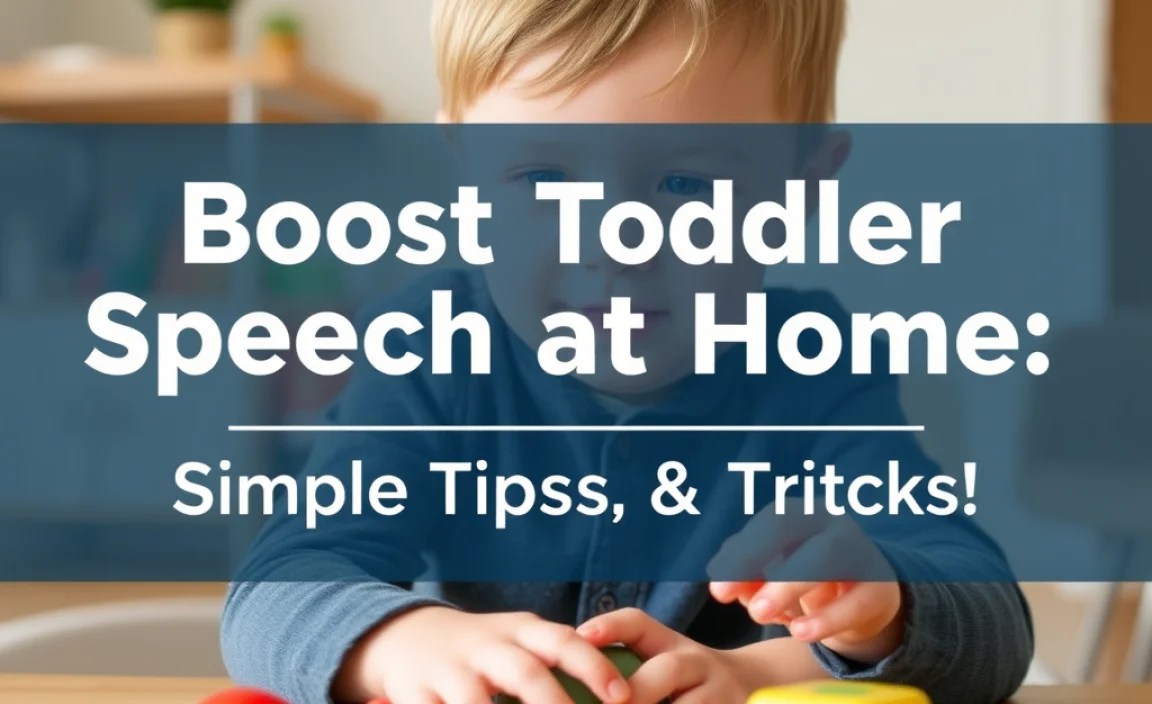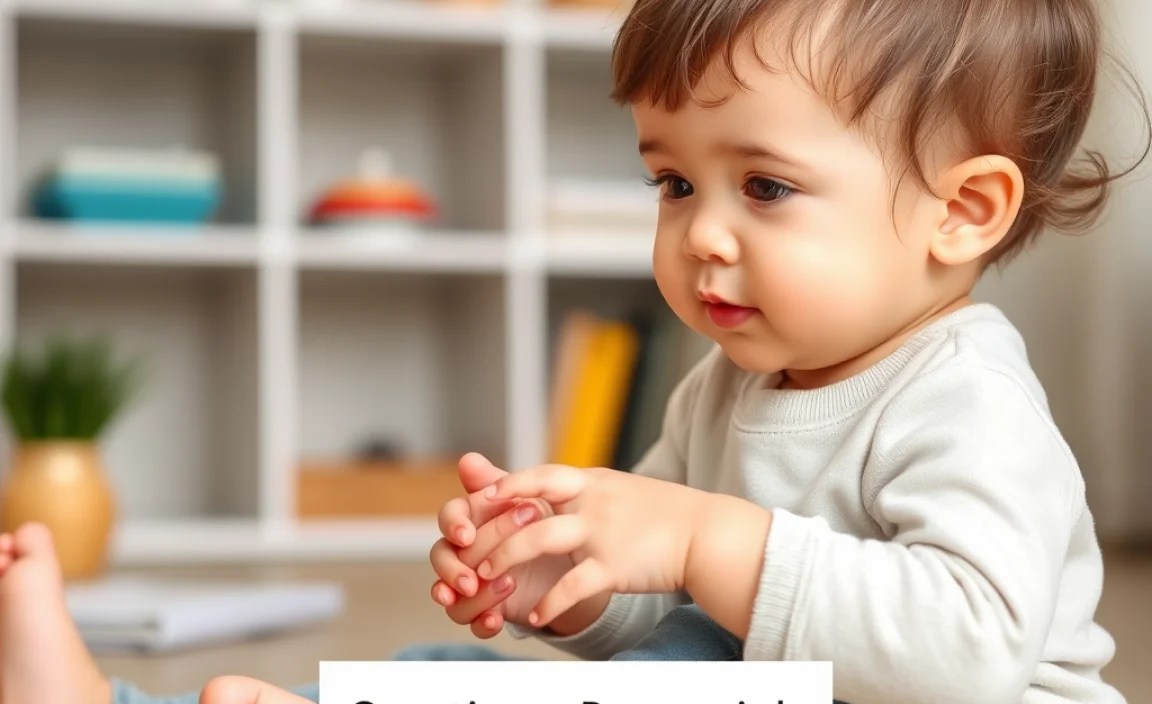Imagine your toddler looking up at you, eyes bright with curiosity. They are eager to share their thoughts but might struggle to find words. Encouraging toddler speech at home can transform these moments. How can you help them find their voice? This journey can be fun and rewarding for both of you.
Did you know toddlers learn language by hearing and imitating? Every word you speak helps them. It’s like a game of follow-the-leader, and you’re the leader. By creating a language-rich environment, you open doors to their speech development.
What if you could turn everyday activities into learning opportunities? You can! Simple games and conversations can make a huge difference. Let’s explore how you can start encouraging toddler speech at home.
At A Glance
Key Takeaways
- Talk often with your toddler to boost speech skills.
- Use songs and rhymes to make learning fun.
- Read together to enhance vocabulary and listening.
- Encouraging toddler speech at home builds confidence.
- Play games that encourage communication and expression.
Talking Frequently With Your Toddler

Talking is key to encouraging toddler speech at home. The more you talk, the more they learn. Describe your actions, objects, and daily routines. Make it a habit to talk during meals, playtime, and even walks. Use simple words and clear sentences. This helps toddlers to understand and mimic speech.
- Describe daily activities, like cooking or cleaning.
- Point out objects and name them together.
- Ask questions to spark conversation.
- Use gestures and facial expressions.
- Repeat new words often for memory.
- Talk during car rides or outdoor walks.
Talking frequently helps toddlers link words with meanings. They learn by listening and imitating. Over time, they will try to form sentences themselves. Patience and practice are key. Celebrate their attempts, and they will gain confidence. Your words build their world, one sentence at a time.
Fun Fact or Stats : Toddlers learn about 2-3 new words every day!
Using Songs and Rhymes

Songs and rhymes are magical tools for toddlers. They capture attention and make learning fun. Singing songs can help with language rhythm and word patterns. Rhymes introduce new vocabulary in a playful way. Encourage your toddler to join in, clap, or dance to songs. Let them feel the joy of music and language together.
- Sing nursery rhymes or simple songs.
- Use hand movements for action songs.
- Encourage clapping or dancing.
- Repeat favorite songs often.
- Make up silly rhymes together.
- Play music during playtime.
Music and rhymes engage multiple senses. This helps children remember words and phrases. Kids love repetition, so don’t shy away from singing the same songs daily. It not only boosts their speech but also strengthens your bond. Toddlers feel connected through these joyful moments.
Fun Fact or Stats : Singing can improve a child’s ability to recognize rhyming words!
Reading Together

Reading is a powerful way to boost speech development. Choose colorful books with simple stories. Let your toddler turn pages and point to pictures. As you read, use different voices for characters. Pause to ask questions or let them guess what happens next. This interactive reading makes learning exciting.
- Pick books with bright pictures.
- Use expressive voices for characters.
- Ask questions about the story.
- Let them point at pictures.
- Encourage them to predict story endings.
- Repeat reading favorite books.
Reading fosters imagination and vocabulary growth. It helps toddlers understand story structure and language use. Each story opens a new world for them to explore. Make reading a daily habit, and you’ll see their language skills bloom. Books become windows to a world of words.
Fun Fact or Stats : Reading to children can expand vocabulary by up to 1,000 words per year!
Playing Communication Games

Games are a fantastic way to encourage speech. They create a fun, pressure-free environment for learning. Simple games like “Simon Says” or “I Spy” boost listening and speaking skills. You can also play pretend games, like being shopkeepers or doctors. These activities encourage imagination and vocabulary use.
- Play “Simon Says” for listening practice.
- Try “I Spy” to describe objects.
- Use dress-up for pretend play.
- Encourage role-playing different characters.
- Ask open-ended questions during play.
- Use puppets for storytelling.
Games make learning interactive and enjoyable. They allow toddlers to practice speech naturally. As they play, they develop confidence in using words. You can guide them by asking questions and giving gentle corrections. Remember, the goal is to have fun while learning.
Fun Fact or Stats : Kids spend nearly 50% of their playtime talking!
Creating a Language-Rich Environment

A language-rich home is filled with opportunities to hear and use words. Simple changes can make a big impact. Label items in your home with their names. Use pictures and words. Encourage your toddler to name things they see. Talk about what you do and what they do. This constant exposure helps them absorb language naturally.
- Label objects around the house.
- Use picture and word cards.
- Discuss your daily routines.
- Encourage repeating new words.
- Listen and respond to their chatter.
- Use language during all activities.
Making your home a hub of language is easy and effective. It doesn’t require special tools, just creativity. Engage in conversations, and involve them in daily tasks. Your toddler will gradually pick up and use the languages. Over time, you’ll notice them trying new words and phrases.
Fun Fact or Stats : Kids who grow up in a word-rich environment hear 30 million more words by age 3!
Encouraging Expression Through Art
Art allows toddlers to express themselves without words. Drawing, painting, and crafting are excellent outlets. As they create, talk about their artwork. Ask them to describe colors, shapes, and ideas. This encourages them to find words for their thoughts. Art activities also build fine motor skills, aiding overall development.
- Provide crayons and paper for drawing.
- Use different materials for crafts.
- Discuss their artwork in detail.
- Encourage storytelling through art.
- Use art to teach colors and shapes.
- Display their art proudly.
Art is a bridge between thoughts and words. It offers a way for toddlers to convey feelings and ideas visually. When they associate art with language, both skills improve. Celebrate their creativity and encourage them to share stories about their art. This nurtures both speech and self-expression.
Fun Fact or Stats : Art activities can increase creativity and language skills by 15%!
| Activity | Language Benefit | Fun Element | Frequency |
|---|---|---|---|
| Reading | Vocabulary growth | Storytelling | Daily |
| Singing | Rhythm and rhyme | Music | Daily |
| Talking | Word association | Conversations | All day |
| Art | Expression and description | Creativity | Weekly |
Conclusion
Encouraging toddler speech at home is a rewarding journey. It involves talking, singing, and reading. Simple games and art activities support their language development. As you engage with them, watch their confidence grow. With patience and creativity, you help them find their voice.
FAQs
Question: Why is talking important for toddlers?
Answer: Talking helps toddlers learn words and understand language. It’s important for brain development. When you talk to your toddler, you give them more chances to learn. They listen and start to imitate sounds and words. Encouraging toddler speech at home helps them gain confidence in communicating.
Question: How can I use songs to help my toddler speak?
Answer: Songs are fun and rhythmic, making learning enjoyable. Singing helps toddlers recognize patterns in language. Try singing nursery rhymes and action songs. Encourage your toddler to sing along, clap, or dance. This makes learning playful, increasing their interest in words.
Question: What types of books are best for toddlers?
Answer: Choose books with colorful pictures and simple stories. Books with rhymes and repetitive text are great. They help toddlers predict and learn new words. Interactive books with flaps or textures also engage their senses. Reading is a powerful way to support speech development.
Question: How does playing games help with speech?
Answer: Games promote communication and listening skills. They create a relaxed environment for toddlers to practice speech. Games like “Simon Says” and “I Spy” involve following instructions and describing things. Through play, kids learn to express themselves and gain confidence in using words.
Question: What is a language-rich environment?
Answer: A language-rich environment is full of words and opportunities to talk. This includes labeling objects, reading, and having daily conversations. It’s important to describe activities and encourage your toddler to speak. Creating such an environment supports language learning naturally.
Question: How can art activities boost speech?
Answer: Art activities encourage self-expression and creativity. When toddlers create art, they learn to describe their work. Discussing colors, shapes, and ideas builds vocabulary. Art also improves fine motor skills. It provides a way for toddlers to communicate without words, enhancing their language development.